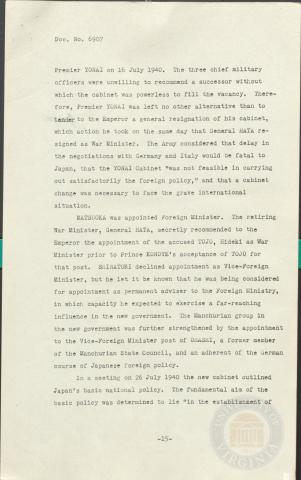
Page 15
| Parent | Doc. 6907 - Collaboration Between Japan, Germany and Italy, Volume 1 - Opening Statement |
|---|---|
| Date | |
| Language | English |
| Collection | Tavenner Papers & IMTFE Official Records |
| Box | Box 15 |
| Folder | Japan, Germany, Italy Collaboration Vol 1 |
| Repository | University of Virginia Law Library |
Doc. No. 6907
Premier YONAI on 16 July 1940. The three chief military officers were unwilling to recommend a successor without which the cabinet was powerless to fill the vacancy. There¬fore, Premier YONAI was left no other alternative than to tender to the Emperor a general resignation of his cabinet, which action he took on the same day that General HATA re¬signed as War Minister. The Army considered that delay in the negotiations with Germany and Italy would be fatal to Japan, that the YONAI Cabinet "was not feasible in carrying out satisfactorily the foreign policy," and that a cabinet change was necessary to face the grave international situation.
MATSUOKA was appointed Foreign Minister. The retiring War Minister, General HATA, secretly recommended to the Emperor the appointment of the accused TOJO, Hideki as War Minister prior to Prince KONOYE's acceptance of TOJO for that post. SHIRATORI declined appointment as Vice-Foreign Minister, but he let it be known that he was being considered for appointment as permanent adviser to the Foreign Ministry, in which capacity he expected to exercise a far-reaching influence in the new government. The Manchurian group in the new government was further strengthened by the appointment to the Vice-Foreign Minister post of OHASHI, a former member of the Manchurian State Council, and an adherent of the German course of Japanese foreign policy.
In a meeting on 26 July 1940 the new cabinet outlined Japan's basic national policy. The fundamental aim of the basic policy was determined to lie "in the establishment of
